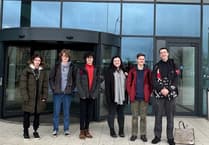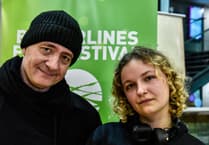Reverend Sean Semple in his Remembrance Sunday sermon at St Mary’s Church Ross-on-Wye shared a religious perspective for Waging Peace in the context of the last century’s history of conscripted armed conflict.
Ross on Wye society remembered all victims of all wars leading into the weekend within a sense of shock, disillusion and fear for the world’s current military problems.
These complex concerns included revived awareness of the circumstances leading to the declaration of war (WW1) on August 4th 1914. Two days earlier Kier Hardy, a Scottish trade unionist, pacifist and former leader of the parliamentary Labour party, addressed 100,000 anti-war protesters in Trafalgar Square. Dismissed by the right-wing Press, the crowd’s concerns about initiating armed conflict were swept away by a populist media, the hive and cry of war-fever, and the fading control of imperialism.
Ross has a proud history of fairness and social justice, and concerns including the presence since 1665 of Quakers and civic , the subsequent campaigns against slavery, the establishment of ethical banking, and support of ‘dissenters’ of conscience in the English Marches.
Sunday remembrance at The Prospect saw a strong representation of cadets’ forces for a Menin Gate ceremony and reading of the fallen names, expertly marshalled by the Royal British Legion.
Reverend Sean led the Remembrance Service, with the full choir singing Fauré’s requiem, “Those in Peril on the Sea”, and the Holst’s 1917 Thaxted tune for “I Vow to Thee My Country’. The Parade of Standards was followed by his incisive address–a present-day reflection on the need to Wage Peace in 2023.
(Edited to 400 words–full sermon available on request as a word file)
“ Remembrance Sunday presents those who profess the Christian faith with a dilemma: today we are called to remember, and this is something Christians do well as it is hardwired into our sacramental life. Today, we give thanks for those who died to protect our country and way of life, and we empathise and grieve with those who have experienced loss because of war.
On Remembrance Sunday we speak passionately of peace, and long for the peace of Christ to inspire people and transform situations of conflict so that “swords shall be beaten into ploughshares, and spears into pruning hooks”1.
But here is the dilemma: we remember and are thankful for and honour those who have fought for peace, those who have killed for peace. It is at this point that some people of faith, or even no faith struggle and find it impossible to condone, or to support, or seem to celebrate such bloodshed. So today we recognise this viewpoint by having a white poppy wreath laid in front of our altar. White poppies symbolise a commitment to peace and non-violent solutions to conflict. Their key message is “never again”.
Next to it will be laid a wreath of red poppies, symbolising the sacrifice of those who, when all non-violent and diplomatic efforts had failed, became part of the last resort against naked aggression and evil. Sadly, in a fallen world it is necessary to engage police and military forces to protect against hostile, destructive forces, and sometimes to fight for a better world.
If there is to be greater peace in the world, it has to be practiced on the streets of every village, town, borough, and city. It has to be practiced on Socials. It has to be practiced in playgrounds and on football terraces. In places of worship and during protest marches. Because these can be the battlegrounds where people are first wounded; where aggression and radicalisation are nurtured. It is here that the poisonous seeds of war are sown.
Peace comes through the extremely hard work of forgiveness. Through recognising and overcoming our own prejudices, and having the courage to be fair and just, rather than fleetingly popular. Peace comes from support for peace initiatives, and humanitarian aid. It comes from a basic concern for our neighbour’s wellbeing.
Two wreaths: Passionate-held but differing views, tolerated and respected together.




